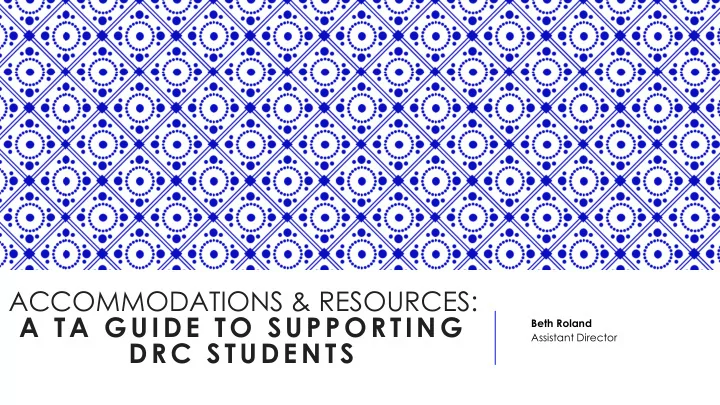

ACCOMMODATIONS & RESOURCES: A TA GUIDE TO SUPPORTING Beth Roland Assistant Director DRC STUDENTS
WHY TALK ABOUT DISABILITY? FACULTY and TA’s HAVE AN IMPACT ON STUDENTS. • Students with disabilities report not finishing their degree because of: • Inconsistent Accommodations • Lack of faculty and TA awareness of disabilities, disability resources and implementing accommodations • Students have negative attitudes/perceptions of faculty and instructors (and sometimes TA’s, although often they feel more comfortable with TA’s)
RAISE YOUR HAND IF… You’ve received an accommodation letter from a student this semester You’ve not understood an accommodation requested You’ve consulted with a faculty member about a student who needed accommodations You’ve referred a student to the DRC You know how to refer students to the DRC You’ve helped a student receive access to accommodations You’ve facilitated or helped facilitate an accessible class
UF STUDENTS • DRC students registered in 2016-2017 • 2,297 students • 4.4% of the total UF student population • Categories of disability, by primary disability: • 31% Mental Health Impairments • 26% Attention Deficit/Hyperactivity Disorder • 18% Learning Disorders • 13% Medical/Chronic Health Conditions • 6% Other: Hearing, Vision, TBI, Autism • 5% Physical/Mobility Impairments
MEET DELAINA: THINK ABOUT WHETHER YOUR COURSES ARE ACCESSIBLE OR INCLUSIVE FOR HER https://www.youtube.com/watch?v=mywCvtGjnTQ
RE-FRAMING DISABILITY Medical Model to Social Model Gold standard is universal design Designing courses to be accessible Disability results from barriers in the classroom environment or course
COMMON ACADEMIC ACCOMMODATIONS • Note-taking services • Access to course materials (e.g. copy of PowerPoint Presentations) • Access to course materials in an alternative format • Services for students with hearing impairments (e.g. captioning, interpreter) • Accommodated testing (e.g. access to an extended exam time, a low distraction environment, assistive technology, a scribe) • Educational/Lab Assistants
DRC SERVICES • Disability management counseling • Strategy and academic coaching sessions • Classroom/testing accommodations • Screenings for Learning Disorders, ADHD, and Mental Health Disorders • Disability specific strategy groups • Assistive Technology Lab • Advocacy for academic accommodations • Support with attitudinal barriers
LOW DISTRACTION TESTING
PRIVATE TESTING ROOM
TESTING INTEGRITY • Proctors • Closed circuit video monitoring • Restricted access drive for saving test materials • Full-time staff oversee the test material preparation • Incident reports where testing staff suspect academic dishonesty are reported to the professor and Student Conflict Resolution
QUESTIONS? 001 Building 0020 (Reid Hall) P.O. Box 114085 352-392-8565 352-392-8570 (Fax) accessuf@dso.ufl.edu gabriellam@dso.ufl.edu If a student in your class has a disability and is not yet registered with our office, you may have them contact us at the phone number above.
Recommend
More recommend